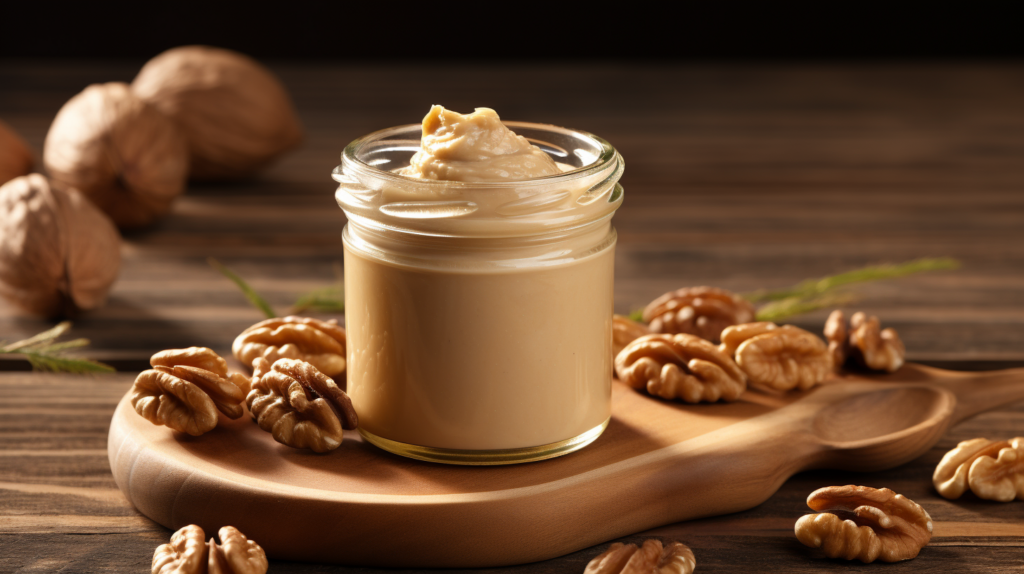If you’re looking for a powerful and natural way to support your brain health and balance your cholesterol, you might want to consider adding walnuts to your diet. Not only are they delicious and versatile, but walnuts also contain an impressive array of nutrients that can provide numerous health benefits.
Walnuts are a rich source of healthy fats, fiber, antioxidants, vitamins, and minerals, making them an excellent choice for a nutritious and satisfying snack or ingredient. In this article, we’ll explore the many ways in which walnuts can naturally support your brain health and cholesterol levels, while also discussing their nutritional value and practical applications.
Key Takeaways
- Walnuts can provide numerous health benefits, including supporting brain health and balancing cholesterol levels.
- Walnuts are a rich source of healthy fats, fiber, antioxidants, vitamins, and minerals, making them a nutritious and satisfying snack or ingredient.
- By incorporating walnuts into your diet, you can potentially improve your cognitive function, heart health, weight management, diabetes management, skin health, and hair health.

Understanding the Health Benefits of Walnuts
Walnuts are a true powerhouse when it comes to their health benefits. Not only are they a great source of protein, fiber, and healthy fats, but they’re also packed with essential vitamins and minerals. Incorporating walnuts into your diet can have a significant positive impact on your overall health and well-being.
Let’s take a closer look at some of the specific health benefits of walnuts:
Brain Health
The omega-3 fatty acids found in walnuts are essential for maintaining healthy brain function. These nutrients can help improve cognitive function, memory, and even reduce the risk of age-related cognitive decline. Walnuts also contain antioxidants that can protect the brain from oxidative stress and inflammation.
Heart Health
Walnuts are rich in healthy fats, particularly alpha-linolenic acid (ALA), which has been shown to reduce cholesterol levels and lower the risk of heart disease. Additionally, their high fiber content can help regulate blood pressure and reduce inflammation in the cardiovascular system, promoting overall heart health.
Weight Loss
Despite their relatively high calorie count, incorporating walnuts into your diet can actually support weight loss efforts. Their high fiber content can help promote feelings of satiety, reducing overall calorie intake. Additionally, walnuts contain healthy fats that can help boost metabolism and promote fat burning.
Diabetes Management
Walnuts have a low glycemic index, which means they can help regulate blood sugar levels in individuals with diabetes. They also contain nutrients such as magnesium and polyphenols that can improve insulin sensitivity and reduce inflammation in the body.
Skin and Hair Health
The vitamin E and antioxidants found in walnuts can help combat oxidative stress in the body, promoting healthy skin and hair. Additionally, their omega-3 fatty acid content can strengthen hair follicles and improve hair texture.
As you can see, incorporating walnuts into your diet can have numerous positive health benefits. From brain and heart health to weight management and diabetes control, their nutritional value cannot be understated.

The Nutritional Powerhouse of Walnuts
Walnuts are a nutritional powerhouse, packed with essential nutrients that contribute to a wide range of health benefits. One of the key nutritional benefits of walnuts is their high content of healthy fats, fiber, antioxidants, vitamins, and minerals.
One of the most significant components of walnuts is their high levels of omega-3 fatty acids. These healthy fats are essential for brain health, as they contribute to the development and function of nerve cells. They also support heart health by reducing inflammation and improving cholesterol levels.
Walnuts are also rich in antioxidants, which help protect the body from damage caused by harmful molecules known as free radicals. These antioxidants include vitamin E and polyphenols, which can reduce the risk of chronic diseases such as cancer and heart disease.
In addition to these benefits, walnuts also contain several essential vitamins and minerals. These include vitamin B6, which is important for brain function, and magnesium, which plays a role in regulating blood pressure and maintaining strong bones.
Overall, the nutritional value of walnuts is impressive and contributes to their numerous health benefits, making them a smart addition to any diet.
Walnuts for Brain Health
Walnuts are not only a delicious snack but also offer several health benefits, including improving brain function. The nutrients within walnuts, including omega-3 fatty acids, antioxidants, and vitamins E and B6, have been shown to enhance cognitive function and protect against age-related cognitive decline.
Omega-3 fatty acids found in walnuts are essential for brain health as they aid in the development and maintenance of brain function. They help improve memory, learning abilities, and prevent mental health disorders such as depression and anxiety. Antioxidants found in walnuts can help reduce inflammation and oxidative stress in the brain, which contributes to cognitive decline. Lastly, vitamins E and B6 found in walnuts can also improve brain health by reducing inflammation and boosting neurotransmitter activity in the brain, which helps neurons communicate with each other more effectively.
Research has shown that consuming walnuts regularly can improve cognitive function, including memory and processing speed. In one study, adults who consumed walnuts daily for six months showed improved memory and cognitive function compared to those who did not consume walnuts.
If you want to take advantage of the brain-boosting benefits of walnuts, it is recommended to consume them regularly, as part of a balanced diet. Consider adding walnuts to your morning oatmeal, trail mix, or as a snack on their own to reap their benefits.

Maintaining Heart Health with Walnuts
Walnuts are not only a delicious snack, but they also have numerous health benefits, especially when it comes to maintaining heart health. Incorporating walnuts into your diet can help lower cholesterol levels, reduce inflammation, and promote overall heart health.
Healthy Fats
Walnuts are high in healthy fats, including monounsaturated and polyunsaturated fats. These fats can help decrease bad cholesterol (LDL) levels in the blood, which can decrease the risk of heart disease.
Fiber
Walnuts are also a great source of fiber. Fiber can help lower cholesterol levels and reduce the risk of heart disease. It can also improve digestion and make you feel full for longer periods of time, which can help with weight management.
Antioxidants
Walnuts contain powerful antioxidants, including vitamin E and polyphenols. Antioxidants can help reduce inflammation in the body, which can decrease the risk of heart disease. They can also protect the body against damage by free radicals, which can contribute to chronic diseases.
How Much to Eat
To reap the heart-healthy benefits of walnuts, try to incorporate them into your diet on a regular basis. The American Heart Association recommends eating a handful of walnuts (about 1.5 ounces) at least two times per week.
Ways to Incorporate Walnuts
There are many ways to add walnuts to your diet. Try sprinkling them on salads, oatmeal, or yogurt for a healthy crunch. You can also use them as a topping for baked goods or incorporate them into your favorite recipes, like banana bread or pesto.
Precautions and Considerations
While walnuts are generally safe for most people to consume, it’s important to be aware of potential allergies. If you have a nut allergy, you should avoid walnuts. Additionally, while walnuts are a healthy snack, they are also high in calories. Be sure to moderate your intake to avoid weight gain.

Walnuts for Weight Loss
If you’re looking for a healthy snack to aid in your weight loss journey, walnuts might just be your best bet. Not only are they packed with nutrients, but they also have several weight loss benefits that make them an ideal addition to your diet.
One of the key reasons that walnuts can support weight loss goals is their high fiber content. Fiber is essential for promoting feelings of fullness and satiety, which can help reduce overall calorie intake. In fact, studies have shown that adding walnuts to your diet can lead to increased feelings of fullness and reduced hunger, ultimately leading to a lower calorie intake throughout the day.
Additionally, walnuts can help regulate blood sugar levels, which can also contribute to weight loss efforts. The healthy fats and protein in walnuts can slow down the release of sugar into the bloodstream, preventing sudden spikes and crashes in blood sugar that can lead to cravings and overeating.
When it comes to including walnuts in your diet for weight loss, it’s important to keep portion sizes in mind. While walnuts are healthy, they are also calorie-dense, so it’s best to consume them in moderation. A serving size of walnuts is typically around 1 ounce or 14 halves, which contains about 185 calories and 4 grams of protein.
Try adding walnuts to your breakfast by sprinkling them on top of oatmeal or Greek yogurt. You can also include them in salads, stir-fries, or as a snack on their own. Just be sure to keep portion sizes in check to reap the weight loss benefits without going overboard on calories.
Overall, incorporating walnuts into your diet can have several weight loss benefits, thanks to their high fiber content, ability to promote satiety, and inclusion in a balanced diet for effective weight management.

Managing Diabetes with Walnuts
For those with diabetes, incorporating walnuts into your diet can have a host of benefits. Not only are walnuts low on the glycemic index, meaning they won’t cause a rapid spike in blood sugar levels, but they also contain nutrients that can help improve insulin sensitivity.
Omega-3 fatty acids, found in abundance in walnuts, have been shown to reduce inflammation in the body, which can lead to improved insulin sensitivity. Additionally, the fiber in walnuts can help regulate blood sugar levels, making them a great addition to meals and snacks for those with diabetes.
Studies have also shown that consuming walnuts can reduce the risk of developing type 2 diabetes. One study found that women who consumed walnuts at least twice a week had a significantly lower risk of developing type 2 diabetes compared to those who rarely ate them.
If you have diabetes, it’s important to work with a healthcare professional to determine the appropriate amount of walnuts to include in your diet, as they are calorie-dense and should be consumed in moderation. However, incorporating walnuts into your meals and snacks can be a delicious and nutritious way to manage your condition.

Enhancing Skin Health with Walnuts
Walnuts are not only a delicious snack, but they also offer numerous health benefits. One of these benefits is promoting healthy skin. Here’s how walnuts can enhance your skin:
Antioxidants for Skin Protection
Walnuts are rich in antioxidants, such as vitamin E and polyphenols, which can help protect your skin from oxidative stress caused by environmental factors like pollution and UV rays. These antioxidants can also help prevent skin aging by reducing the appearance of fine lines and wrinkles.
Collagen Production for Elasticity
Collagen is a protein essential for skin health and elasticity. Walnuts contain nutrients like vitamin C, copper, and manganese that aid in collagen production. Consuming walnuts may also help improve skin elasticity and prevent sagging.
Improved Skin Barrier Function
The healthy fats in walnuts, such as omega-3 fatty acids, can help improve skin barrier function. This barrier protects your skin from external stressors and helps retain moisture for a healthier, more radiant appearance.
To reap the skin benefits of walnuts, try adding them to your diet in a variety of ways. You can sprinkle chopped walnuts on top of salads or yogurt, add them to smoothies, or even use them as a crunchy coating for baked chicken or fish. So go ahead and indulge in this tasty snack for beautiful skin!

Nourishing Hair with Walnuts
The health benefits of walnuts are not limited to just brain and heart health. They also have the potential to nourish your hair.
Walnuts contain biotin, an essential B-vitamin that plays a key role in maintaining healthy hair. Biotin deficiency can lead to brittle hair and hair loss. The omega-3 fatty acids present in walnuts can also help strengthen hair follicles and improve hair texture.
Additionally, the vitamin E content in walnuts can contribute to healthy hair growth and prevent hair damage. Vitamin E acts as an antioxidant, protecting hair follicles from oxidative stress and environmental damage.
To reap these hair benefits, try incorporating walnuts into your diet. You can snack on them alone, add them to your favorite trail mix, or sprinkle them on top of a salad.
Another way to incorporate walnuts into your haircare routine is to use walnut oil. Walnut oil is rich in omega-3 fatty acids and vitamin E, making it a great choice for promoting healthy hair growth and preventing hair damage. You can use walnut oil as a scalp massage oil or add it to your conditioner for an extra boost of nourishment. Be sure to do a patch test before applying to your entire scalp to avoid any potential allergic reactions.
With their biotin, omega-3 fatty acids, and vitamin E content, walnuts have the potential to contribute to healthy, strong hair.

Incorporating Walnuts into Your Diet
If you’re looking to reap the benefits of walnuts, it’s important to incorporate them into your diet in a healthy and balanced way. Here are some tips to get started:
- Add a handful of walnuts to your morning oatmeal or yogurt for a protein and fiber boost.
- Use crushed walnuts as a coating for baked chicken or fish.
- Top your salad with a small handful of walnuts for a satisfying crunch.
- Snack on walnuts with a small piece of fruit for a balanced snack.
- Use walnut oil in salad dressings or as a finishing oil for roasted vegetables.
Remember, while walnuts are a nutritious food, they are also high in calories. Stick to a portion size of about 1/4 cup or 1 ounce, which is roughly 14 halves. This will give you the benefits of walnut nutrition without going overboard on calories.
Additionally, if you have a nut allergy, be sure to avoid walnuts and speak with your doctor before incorporating them into your diet. And as always, be mindful of any potential interactions with medications or medical conditions.
By including walnuts in your diet in a healthy and balanced way, you can enjoy the wide range of health benefits they offer, from improved brain function to balanced cholesterol levels and beyond.
Precautions and Considerations
While walnuts offer a wide range of health benefits, it is important to be aware of any precautions and considerations before incorporating them into your diet.
Allergies: Some individuals may have an allergy to tree nuts, including walnuts. If you experience symptoms such as itching, swelling, or difficulty breathing after consuming walnuts, seek medical attention immediately.
Moderation: While walnuts are a healthy addition to any diet, they are also high in calories and fat. It is important to consume them in moderation to avoid overconsumption of calories and unhealthy fats.
Interactions: If you are taking any medications or have any medical conditions, consult with your healthcare provider before adding walnuts to your diet. Walnuts may interact with certain medications, such as blood thinners, and may not be suitable for individuals with certain medical conditions.
Overall, walnuts are a nutritious and delicious addition to a healthy diet, offering numerous health benefits. With these precautions in mind, you can safely incorporate walnuts into your meals and snacks for improved health and well-being.

Conclusion
Walnuts are a nutritional powerhouse that can offer a wide range of health benefits. By incorporating walnuts into your diet, you can naturally support brain health, balance cholesterol levels, and promote overall well-being.
Start Adding Walnuts to Your Diet Today
Whether you snack on them, use them as a topping, or add them to your meals, there are many ways to incorporate walnuts into your diet. Try making a savory walnut pesto or adding chopped walnuts to your morning oatmeal for a filling and nutritious breakfast.
Considerations to Keep in Mind
While walnuts offer many health benefits, it’s important to keep a few considerations in mind. If you have a nut allergy, be sure to avoid walnuts and other tree nuts. Additionally, while walnuts are a healthy food, moderation is key. Eating too many walnuts could lead to unwanted weight gain and other health issues. Finally, if you have a medical condition or take medication, be sure to speak with your healthcare provider before adding walnuts to your diet.
Overall, walnuts are a delicious and nutritious addition to any diet. From enhancing brain health to promoting heart health and aiding in weight loss efforts, walnuts offer a wide range of benefits that make them a smart choice for anyone looking to improve their overall health and well-being. So go ahead and start snacking on some walnuts today!
FAQ
Q: Are walnuts good for brain health?
A: Yes, walnuts are beneficial for brain health due to their high content of omega-3 fatty acids and antioxidants. These nutrients have been shown to enhance cognitive function, improve memory, and reduce the risk of age-related cognitive decline.
Q: How do walnuts support heart health?
A: Walnuts promote heart health by helping to lower cholesterol levels, reduce inflammation, and improve overall cardiovascular function. Their healthy fats, fiber, and antioxidants are key contributors to these benefits.
Q: Can walnuts aid in weight loss?
A: Yes, walnuts can support weight loss efforts. Their high fiber content promotes satiety, helping to control appetite. Including walnuts as part of a balanced diet can contribute to effective weight management.
Q: Are walnuts beneficial for managing diabetes?
A: Walnuts can be beneficial for individuals with diabetes. They have a low glycemic index, which means they have a minimal impact on blood sugar levels. Additionally, walnuts may improve insulin sensitivity and help regulate blood sugar levels.
Q: How can walnuts enhance skin health?
A: Walnuts contain antioxidants, vitamins, and minerals that combat oxidative stress, promote collagen production, and improve skin elasticity. Including walnuts in the diet can contribute to healthy and vibrant skin.
Q: Do walnuts promote hair health?
A: Walnuts can nourish hair due to their omega-3 fatty acids, biotin, and vitamin E content. These nutrients help strengthen hair follicles, promote hair growth, and improve hair texture.
Q: How can I incorporate walnuts into my diet?
A: There are many ways to incorporate walnuts into a healthy diet. You can add them to salads, oatmeal, yogurt, or smoothies. They can also be used as a topping for desserts or baked goods. Experiment with different recipes and find what works best for you.
Q: Are there any precautions or considerations when consuming walnuts?
A: Some individuals may have allergies to tree nuts, including walnuts. It is important to consume walnuts in moderation, as they are calorie-dense. If you have any medical conditions or take medications, it is always best to consult with your healthcare provider before making significant dietary changes.














